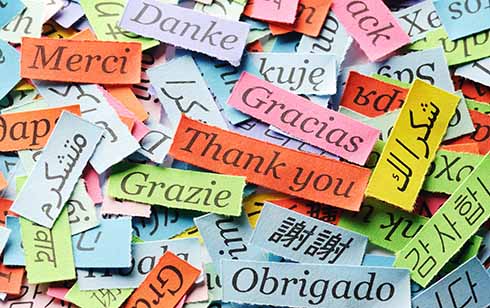
thank you in different languages
The best translators are ghosts. You do not notice them unless you are looking for them.
If you read a book by Dostoevsky or Nietzsche or watch a dubbed French film, you might remember the author or the director’s name, but you will rarely notice the translators. And rightly so. Their job is to let you hear the voice and the message of the author or actors.
When texts held to be sacred are translated, though, translators work under a spotlight. If they alter much loved cadences, mistranslate a word or leave a typo in their translation they can become dartboards. One Anglican translation was known forever as the Wicked Bible because it left out the word ‘not’ in ‘Thou shalt not commit adultery’. And the widespread distaste for the new English translation of the Mass, which replaced another provisional version, shows the threat to reputation involved in translation.
The great Christian translator was the fourth century St Jerome, whose feast day is on 30 September. He is usually painted with a book, sometimes with a lion. He was notoriously gruff, and a prolific writer. He was born in the Balkans, moved later to Rome as a spiritual guide and moral reformer, and then to Palestine as a monk. He translated the New Testament into stylish Latin, annoying many readers who preferred earlier versions, and later translated the Old Testament with the aid of his friend Paula, a notable Hebrew scholar.
Jerome’s various skills and his missions in many parts of the Roman Empire raise a deeper question about translation. What happens when we translate a text or a speech from one language into another, or indeed even when we communicate in the same language to others what someone else has told us?
When we are translating or passing on instructions about where to go and how to buy a ticket, it is all straightforward. We can find exact equivalents in other languages. But when we are trying to catch a nuance, share why we have acted in a particular way, or what our journey means, it is hard to find words that will say exactly what we want them to. Think for example of the English word ‘home’. It is loaded with associations that cannot be caught in other languages. And when we want to speak of the experience of God, the symbols we use will inevitably fail.
The challenge to translation is that in each word we use there is a complex bundle of relationships linking us to our childhood, to the delights and torments of education, to church, to the daily conversations we have and the radio and TV voices we listen to, to significant events in our experience and to our hunger for meaning.
This means that every conversation involves translation. The words we speak are offered hospitality by the people to whom we speak, and are made part of the bundle of relationships that they represent for the other person. They undergo change, usually light but sometimes life-changing. And because the network of relationships that link us to others and to our world are constantly changing, so words will also change their resonance and sometimes their meaning.
The art of translation and of conversation is to listen attentively both to the words we use ourselves and the words that others use and to explore the subtle differences in the way we use them. Conversation between people, whether divided by a single or by different languages is a delicate and necessary art.
Images: Depositphotos.com